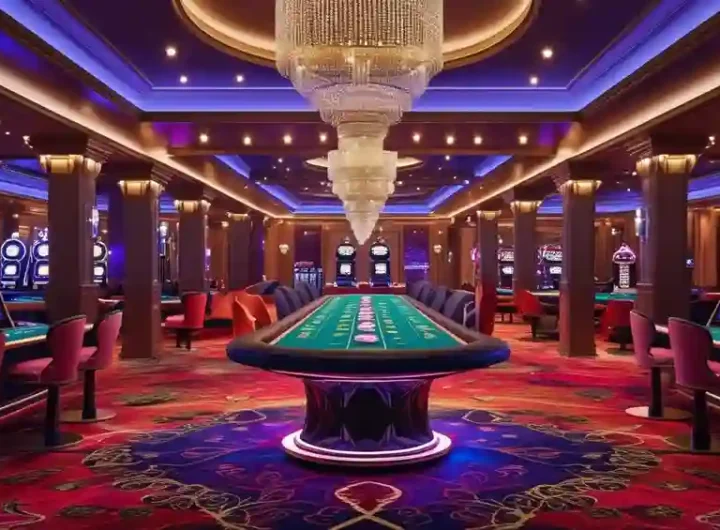
A casino is a place where people can gamble. In addition to gambling, casinos also have restaurants and other entertainment venues. Many people enjoy visiting a casino because it creates an exciting atmosphere.
Casinos make money because every game has a built-in mathematical advantage for the house. This means that they always win in the long run.
Game of chance
Games of chance are popular in casinos because they give people a way to win money and prizes. These games can be found in a variety of forms, including lotteries, casino tables, and even board games. They are often very exciting and adrenaline-pumping, which makes them hard to resist. They also provide a form of entertainment that can be a welcome escape from the hectic pace of today’s modern lifestyle.
Despite the fact that some games of chance may involve a small amount of skill, it is important to remember that they are still considered gambling. Therefore, they are illegal in some countries and states. In addition, there are laws that prevent a person from betting on sporting events or other games of chance if they are not adequately licensed.
If a society conducts a game of chance with a total prize retail value of $5,000 or less, it does not need a licence. However, if the prize is a cash sum or something other than money, a licence is required. The society must prepare an independently audited Audit and Prize Statement for the game of chance.
House edge
The house edge of a casino game is the amount of profit that a casino expects to make over a large number of player bets. This advantage varies by game and region, but it is generally higher for games with strategic decisions (e.g. blackjack and video poker) than for random-based games (e.g. slots). Casinos don’t want to destroy their gamblers with terrible odds, but they also don’t want to give away free money. They find a sweet spot between giving players an even chance and making a small percentage of each bet, on average.
It’s important for a gambler to know their odds before playing any casino game. It’s impossible to avoid the House Edge altogether, but knowing about it can help a gambler understand why casinos always win in the long run. This is where the adage that “the house always wins” comes from. Unless you’re a card counter, it is nearly impossible to beat the house edge in any casino game. But it’s possible to minimize the impact by betting less and playing for shorter periods of time.
Comps
Comps are a big part of the casino business. Whether it’s free rooms, food or show tickets, they can help players rationalize their losses and keep them coming back. Comps also encourage players to play at higher levels and longer than they would otherwise. This is a big reason why it’s important for every casino player to know how comps work.
Almost every 우리카지노 offers a players club, and most offer some kind of complimentary benefits. Comps are based on how much you gamble, how long you play and what type of game you play. Most casinos also track your winnings and losses. This data is compiled into a player’s profile and used to determine your comp level.
Some players erroneously equate their self-worth with the level of comps they receive from casinos. This is a mistake because casinos issue comps based on your theoretical loss. So while you may get rooms and food for free, you’re actually losing money to the casino. This is why players should always play within their budget or bankroll.
Taxes
The decline in state tax revenues during the Great Recession has prompted many states to expand gambling operations. In the last few years, many states have introduced new forms of gambling, such as video games and sports betting, to generate additional revenue. Some states also have increased the maximum tax rate on casino operations. The effect of these changes on economic efficiency has yet to be assessed.
In fiscal year 2015, inflation-adjusted state and local government revenues from major types of gambling grew by 1.8 percent nationwide. Most of these revenues came from lottery, commercial casinos, and racinos. Revenues from pari-mutuel wagering and video gaming machines were much lower.
While the growth of casino operations has been a boon for some communities, it may not be sustainable in the long run. The expansion of gambling activities raises equity issues, since they draw income from low-income households, whose real income has declined. In addition, the social costs of crime associated with casinos may increase. Furthermore, studies of the impact of casinos on crime may not consider visitor populations, which can increase the cost of policing and security.


 Top Reasons Why Players Choose Rajabandot Slot for Big Wins
Top Reasons Why Players Choose Rajabandot Slot for Big Wins  Rajabandot Slot Online: Trusted Platform for Smart Casino Players
Rajabandot Slot Online: Trusted Platform for Smart Casino Players  How Alexistogel Agen Togel Online Resmi Hhadiah Togel Hongkong 4D Terbesar Guarantees the Largest Prizes in Asia
How Alexistogel Agen Togel Online Resmi Hhadiah Togel Hongkong 4D Terbesar Guarantees the Largest Prizes in Asia  Why Bandar Toto Macau Is the Best Choice for Smart Players in 2025
Why Bandar Toto Macau Is the Best Choice for Smart Players in 2025  Rajabandot: Enjoy Fair and Transparent Online Togel Results
Rajabandot: Enjoy Fair and Transparent Online Togel Results  Why Rajabandot Is the Best Choice for Exciting Online Gaming in 2025
Why Rajabandot Is the Best Choice for Exciting Online Gaming in 2025